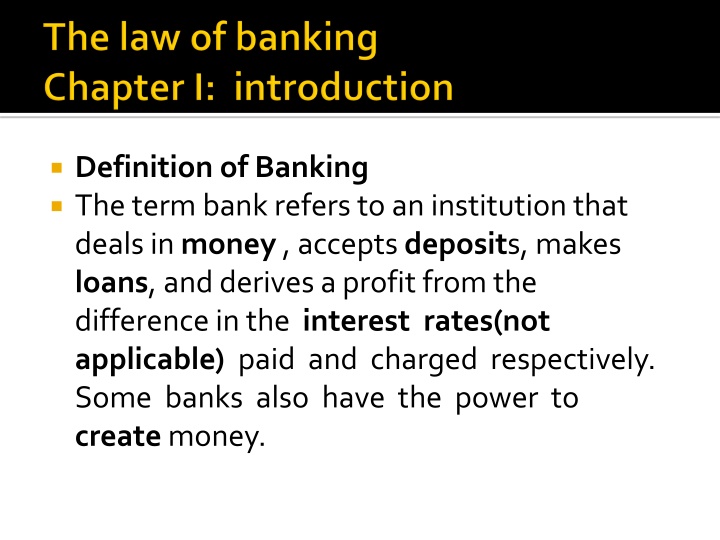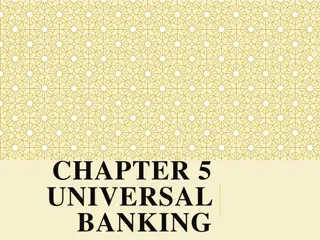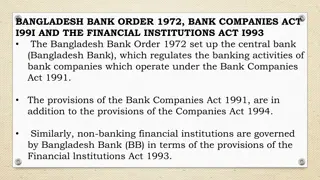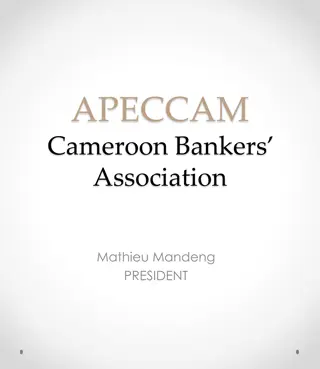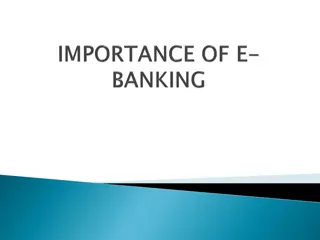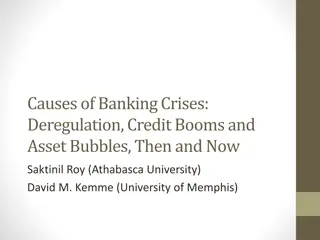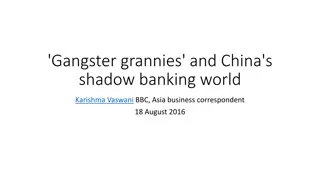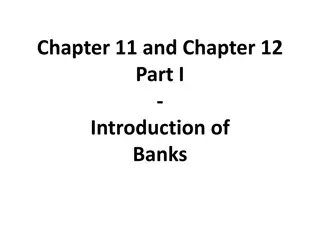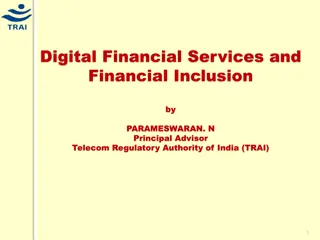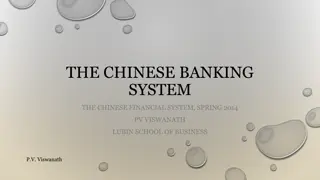Evolution and History of Banking: A Comprehensive Overview
Banking has ancient origins, dating back to Babylon in 1800 BC. Over time, banks evolved from dealing in coins to accepting deposits and making loans. The collapse of the Roman Empire saw a decline in banking, only to be revived in Italian towns like Florence and Genoa. English bankers in the 17th century pioneered deposit banking techniques that shaped the modern banking system we know today.
Download Presentation

Please find below an Image/Link to download the presentation.
The content on the website is provided AS IS for your information and personal use only. It may not be sold, licensed, or shared on other websites without obtaining consent from the author.If you encounter any issues during the download, it is possible that the publisher has removed the file from their server.
You are allowed to download the files provided on this website for personal or commercial use, subject to the condition that they are used lawfully. All files are the property of their respective owners.
The content on the website is provided AS IS for your information and personal use only. It may not be sold, licensed, or shared on other websites without obtaining consent from the author.
E N D
Presentation Transcript
Definition of Banking The term bank refers to an institution that deals in money, accepts deposits, makes loans, and derives a profit from the difference in the interest rates(not applicable) paid and charged respectively. Some banks also have the power to createmoney.
A bank must always have cash balances on hand in order to pay its depositors upon demand or when the amounts credited to them become due. It must also keep a proportion of its assets in forms that can readily be converted into cash. Because it the only way confidence in the banking system can be maintained.
Banking is of ancient origin, though little is known about it prior to the 13 century. Many of the early banks dealt primarily in coin ,and the supplying of foreign and domestic coin of the correct weight and fineness
Another important early group of banking institutions was the merchant bankers, who dealt both in goods and in bills of exchange, providing for the remittance of money and payment of accounts at a distance.
Another form of early banking activity was the acceptance of deposits. These might derive from the deposit of money or valuables for safekeeping or for purposes of transfer to another party
the idea of banks began as long ago as 1,800 BC in Babylon. In those days money lenders made loans to people. In Greece and Rome banks made loans and accepted deposits.
However with the collapse of the Roman Empiretrade slumped and banks temporarily vanished. However banking began to revive again in the 12th and 13th centuries in the Italian towns of Florence and Genoa. In the 16th century a German family called the Fuggersfrom Augsburg became very important bankers
English bankers in particular had, by the 17 thcentury, begun to develop a deposit banking business, and the techniques they evolved were to prove influential elsewhere. The London goldsmiths kept money and valuables in safe custody for their customers.
The first bank notes issued in Europe were by the Bank of Stockholm in 1661.) Some commercial banks are still permitted to issue their own notes, but in most countries, this has become a prerogative of the central bank.
The following list details the institutions that have provided banking services in Somalia since 1920. 1920: The first bank opened in Southern Somalia was the Bancad Italia(Central Bank of Italy) which established its branch in Mogadishu. 1925 The bank opened also another branch in Kisimayo.
1930: The British Government opened in Northern Somalia the Government Savings Bank with the objectives to encourage the people to save parts of their income 1932: In Mogadishu a branch of Cassa di RisparmiodiTorino, an Italian commercial Bank, opens its office.
1936: A branch of BancodiRoma, an Italian commercial bank, was established in Mogadishu. In the same year Bancad Italia opened its third branch in the city of Merca. 1938: BancodiNapoli took over the branch of Cassa di RisparmiodiTorino branch in Mogadishu. 1941: All Italian banks were closed by the British Administration.
1943: The Barclays Bank , a British Commercial Bank, was opened in Mogadishu,Thiscoincides when the British Government Army took control the southern regions of Somalia. 1950: Italian commercial banks, such as BancodiRoma and BancodiNapoli re ope nedtheir branches in Mogadishu.
1950: The Italian Trusteeship Administration (A.F.I.S.) established on 8Th April, 1950 a new currency institution regulator Cassa per la circolazione monetaria della Somalia with its head quarter in Rome. 1952: In Hargeysafor the first time was opened a branch of National Bank of India, a commercial bank owned by the British Government.
1954 : The National Bank of India opens another branch in Berbera. 1954: In Mogadishu was established the first Government owned bank the Credito Somalo founded by Decree No.2 of 22 February 1954issued by A.F.I.S.
1960 : Was established the Central Bank of Somalia named Somali National Bank by Decree No.3 of 30 June, 1960 and converted into Law No.2 of 13 January, 1961.
The Somali National Bank has been authorized to extend to its activities to all the regions of the Republic of Somalia and opened the following branches: Hargeysa 20 August 1961 Berbera 27 January 1962 Kismayo 5 November 1962 Bosaso 26 March 1963 Qardho 26 March 1963 Burao 29 March 1963 Galkaio 5 November 1963 Baidoa 4 January 1965 BeledWeyne 6 January 1965
1961: Banquede Port Said, an Egyptian commercial bank, opened a branch in Mogadishu, and operated until 7 thofMay, 1970. 1968: The Somali Development Bank was established by Decree No.2 of 28 February 1968.
1968: in Mogadishu the National and GrindlaysBank established a new branch and also the bank were operating in Hargeysa and Berbera. 1968: the CreditoSomalowas closed due of liquidity crises and all its assets and liabilities were transferred to the Somali National Bank.
1971 The establishment of two public commercial banks. On the 1 stJanuary, 1971 two commercial banks were established: 1. Somali Savings and Credit Bank 2. Somali Commercial Ban
1975: In 1975 there was a change to the structure of banking system in Somalia. The two commercial banks were amalgamated into the Commercial and Savings Bank of Somalia, at the same time, the Somali National Bank was renamedthe Central Bank of Somalia.
1990: In 1990 following an agreement with the I.M.F. on 1 St July, 1990 implementing the free private oriented economy, a new commercial bankwas established Somali Commercial Bank by Presidential Decree No. 4 of 16 December, 1989, with a capital of So.Shs. 2 billion divided into two thousand shares of one million So.Shs. Each
One billion was paid jointly by the Government and the Central Bank of Somalia and one billion left to the private investors of which only 22 shares were subscribed.
In conclusion, the under listed banks were operating in Somalia at 30 December, 1990: 1. Central Bank of Somalia 2. Commercial and Savings Bank of Somalia 3. Somali Development Bank 4. Somali Commercial Bank
